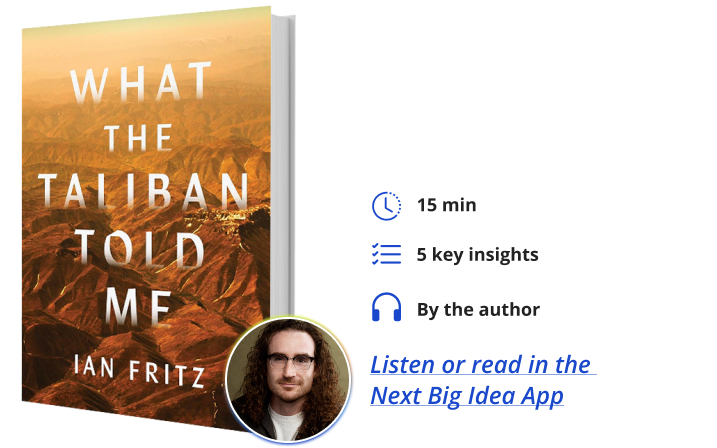Ian Fritz is a writer who was an airborne cryptologic linguist for the US Air Force from 2008 to 2013 before becoming a physician.
Below, Ian shares five key insights from his new book, What the Taliban Told Me. Listen to the audio version—read by Ian himself—in the Next Big Idea App.

1. Learn another language and listen to the world change.
Whether Charlemagne actually said it or not, to speak another language really is to possess a second soul. I grew up in a small town in North Florida, and while I was exposed to other languages as a child, I only knew and spoke English before I joined the Air Force to become a linguist.
I knew learning a new language would be enlightening. However, I thought it would be like all the learning I’d done in school before that, mostly just an accumulation of facts. But as I was learning Farsi, I came to see that learning another language isn’t as simple as learning lists of vocabulary and rules of grammar.
If you truly want to become fluent, somewhere along the way, you have to learn how to think and sometimes even feel differently. Admittedly, this is hard work, but it is completely worth it. Once you learn enough and stop translating, once you can start thinking in that new language, you can’t help but hear and, therefore, see the world anew. Be it about something as simple as choosing the right word for a specific situation or something as complicated as figuring out how to tell someone you love them, it will change you.
2. The way we wage war has changed, and not always for the better.
Today, it’s possible, sometimes even preferable, to conduct a significant portion of a warfighting effort from thousands of miles away, thanks to the advent of drones and other novel technologies. Even if you’re not halfway across the world but actually deployed to the place where the war is happening, there are other positions that allow you to contribute to the fight from afar. I was technically overhead in the battles I was in, but even then, I was thousands of feet away from the enemies we were fighting.
“There is significant moral confusion that can arise from knowing that you’ve killed an enemy despite never seeing them, never being threatened by them, or even never having been in the same time zone as them.”
This type of warfare has benefits, at least for the more technologically advanced fighters; the U.S. and other Western countries see far fewer casualties than they did in previous wars. However, this battlefield safety comes at a cost for those fighting these strange, asynchronous wars. There is significant moral confusion that can arise from knowing that you’ve killed an enemy despite never seeing them, never being threatened by them, or even never having been in the same time zone as them. While our modern warfare has allowed us to save lives on the battlefield, outside of combat, veteran suicide rates have never been higher. This begs the question as to whether these changes are necessarily good ones.
3: You can’t kill an idea.
Most wars throughout history have been centered around ideas, be it which country should own which land, which people deserve to be murdered, or which dictator should have all the power he wants. The war in Afghanistan was no different from these other wars in that it, too, was about ideas. However, unlike most other wars, it wasn’t about whether one idea was right or wrong; it was about killing certain ideas.
The US convinced themselves that they had managed to kill the Taliban for a time. Not long after our invasion, the Taliban capitulated en masse, and their regime fell. What they failed to account for was the immutable fact that everything dies twice: once when it’s killed, and again when its name is uttered for the last time. There was a great irony here, in that it was the US who kept saying the name, kept keeping the idea of the Taliban alive, until one day, they really were resurrected, more powerful than before.
The Taliban, too, was, and still is obsessed with killing an idea, that of democracy and basic human rights for all. However, they’re making the same mistake that the US did. Every time they try to name the women’s rights that they’ve destroyed, they invite us to remember that there are still those brave women and men in Afghanistan who will fight against the Taliban’s tyranny.
4. Know when to ask for help.
As a linguist onboard Special Operations aircraft, it was all but impossible to ask for help. No one else on the plane was trained as a linguist, and the technology that might have allowed me to ask for help from someone outside that specific plane didn’t exist. My position was, by design, one man deep. I was trained to rely on myself, to find ways to try and solve sometimes unsolvable problems, usually in the heat of battle. This meant that in the months that I spent struggling with depression, moral injury, and ultimately suicidal thoughts, all I knew how to do was try and solve the problem myself.
“We’re never truly alone in our fights.”
What I couldn’t see was that there are some problems that are too big for one person to address, no matter how hard that person tries or how much they want to solve it. Sometimes, maybe even most of the time, we have to believe that others want to help us and that it’s okay to ask for help. Even if we are in a one-man or woman-deep position, we’re never truly alone in our fights.
5. If you listen long enough, anything can change.
This sort of change comes from listening to the stories of those whom you either wouldn’t normally listen to or those whose stories you already think you know. The first time I understood that this change was possible came from my time listening to the Taliban. The Taliban as an organization is still a blight on the earth, however, so many of the individual members of the Taliban were, or are, average humans who have grown tired of war, and will do just about anything to bring it to an end.
It would be easy to think that this insight might only be true for such extreme experiences as fighting in a war, but that isn’t the case. When I went to medical school after leaving the Air Force, I saw time and again how different a patient’s story could be from the one that had been documented in their chart and how their life could be changed by proper listening. Since leaving medical school, I’ve repeatedly seen just how important it is to listen to the stories of others and watch how everything you thought you knew about them can change.
To listen to the audio version read by author Ian Fritz, download the Next Big Idea App today:
































